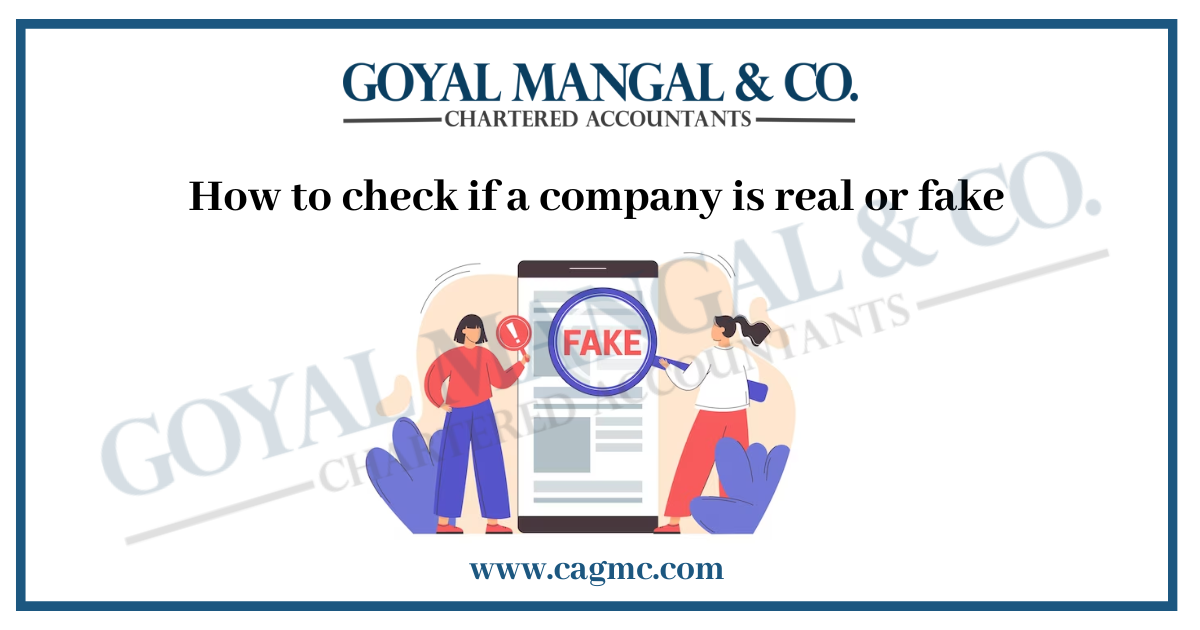
In today’s era, where rapidly growing the presence of online business. It requires how to know whether the Company is fake or real. Whether someone is going to invest, make a purchase, or generally conduct due diligence, knowing if the company is real or fake is a skill that can save financial scams. This article provides you with a comprehensive guide regarding how to check if a company is real or fake. It will help you to know the business landscape with confidence.
Table of Content
- Meaning of Company
- How do you check if a Company is Real or Fake?
- Final Words
Meaning of Company
In the business sense, a Company is a legally recognized body, made up for the motive of conducting commercial performances, generating profits, and giving goods or services. Companies are generally made to be involved in several economic activities and subject to laws and guidelines governing their particular operations.
Companies are widely depending on the motive, size, and sector. In India, Companies are regulated by the Companies Act, 2013, in which they are settled. The Company term is also referred to as “Firm” or “business”. It is a basic concept in the commerce of the globe and entrepreneurship.
There are several kinds of companies, such as:
- Sole Proprietorship: A business owned and operated by a single individual. It is not a separate legal entity from the owner.
- Partnership: A firm, which is run by two or more persons and they will share liabilities and profits generated in the business. Partnerships can be limited liability partnerships (LLPs), general partnerships, or limited partnerships.
- Limited Liability Company (LLC): LLC is a hybrid business framework with a combination of corporations, and partnership features in it. It provides limited liability to its members (owners) while allowing for flexibility in management and taxation.
- Corporation: A legal entity that exists separately from its owners (shareholders). It offers limited liability protection to its shareholders, meaning their assets are generally shielded from the company’s debts and liabilities. Corporations can be publicly traded (open to the public through stock markets) or privately held.
- Nonprofit Organization: An entity formed for purposes other than making a profit. Nonprofits are typically engaged in charitable, educational, or social service activities.
How do you check if a Company is Real or Fake?
It is a crucial step to check, whether the company is real or fake. It ensures safety during dealing in businesses, mainly when financial transactions or investments. Here are certain steps that can be remembered in mind to verify the company’s authenticity:
- Name and registration of the Company: To verify the company’s registration and legal name, you should visit the Ministry of Corporate Affairs (MCA) website. It is an official website for the MCA Company check, and also MCA will help you to identify how to check if a company is legally registered.
- Address of business: It is advisable, to check the physical address of the Company, and also use online maps and directories to confirm that the existing address exists and looks appropriate for the business type.
- Contact details: Make sure the company gives valid details to contact them. It includes email addresses and working phone numbers. Try to contact them by these modes to see if you receive a response.
- Website: Check the company’s review. Legitimate companies generally have professionally designed websites with proper information in detail about goods and services.
- Online Presence: Search and read about the company on online platforms and read reviews. Fake companies mainly don’t have a vast online presence, or they may have negative reviews and warnings from other customers.
- History of business: Read about the company’s history, which involves the establishment date, and major milestones. Also, check any past legal procedures or bankruptcies going against the company.
- Certifications and Licensing: Check if the company is having any required licenses or has achieved any certifications needed for its industry. Government and particular industry websites mainly give information on valid licenses.
- Scam databases: Consult with the online scam databases or fraud alerts to see in case the company’s name is mentioned under fraud. One can check from the Rippoff report, Scam watch, and Scam detector.
- Trust seals and logos: Businesses have displayed their logos, trust seals or certifications on their company’s websites. Meanwhile, these can be fake, so remember to verify their authenticity.
- Signs of common scams: Be alert and educated about the common scams like pressure to make quick decisions, high returns, unsolicited calls or emails, and promises of unrealistically high returns.
- Methods of payment: Be aware of companies, that only accept non-traceable payment methods like wire transfers, crypto currency, or money orders. Real companies generally provide more secure payment options.
Final Words
In conclusion, where line between authenticity and deception continues to blur. The capability to know the Company’s legitimacy is an invaluable skill. By following the above-mentioned steps and principles one can empower oneself to make firm decisions, have more transparency, protect your assets, and trustworthy business environment. Keep in mind that the effort one puts into verifying a company’s authenticity cannot only safeguard you but also support you in fighting against fraudulent performances. MCA will play a major role in finding out how to identify fake companies in India.


